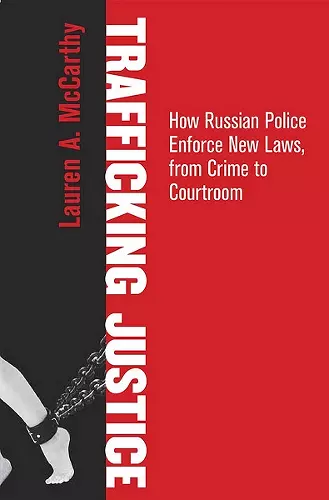Trafficking Justice
How Russian Police Enforce New Laws, from Crime to Courtroom
Format:Hardback
Publisher:Cornell University Press
Published:16th Nov '15
Currently unavailable, and unfortunately no date known when it will be back

In response to a growing human trafficking problem and domestic and international pressure, human trafficking and the use of slave labor were first criminalized in Russia in 2003. In Trafficking Justice, Lauren A. McCarthy explains why Russian police, prosecutors, and judges have largely ignored this new weapon in their legal arsenal, despite the fact that the law was intended to make it easier to pursue trafficking cases.Using a combination of interview data, participant observation, and an original dataset of more than 5,500 Russian news media articles on human trafficking cases, McCarthy explores how trafficking cases make their way through the criminal justice system, covering multiple forms of the crime—sexual, labor, and child trafficking—over the period 2003–2013. She argues that to understand how law enforcement agencies have dealt with trafficking, it is critical to understand how their "institutional machinery"—the incentives, culture, and structure of their organizations—channels decision-making on human trafficking cases toward a familiar set of routines and practices and away from using the new law. As a result, law enforcement often chooses to charge and prosecute traffickers with related crimes, such as kidnapping or recruitment into prostitution, rather than under the 2003 trafficking law because these other charges are more familiar and easier to bring to a successful resolution. In other words, after ten years of practice, Russian law enforcement has settled on a policy of prosecuting traffickers, not trafficking.
In a fine addition to the literature on how Russian governance really works, McCarthy traces this laxity to what she calls 'institutional machinery': incentives, structures, and a culture operating within Russian legal and judicial institutions that militate against the strenuous enforcement of new rules that introduce complex choices and burdensome procedures on law enforcement agencies.
-- Robert Legvold * Foreign Affairs *It is rare to encounter serious research on the implementation of new laws anywhere, let alone in Russia, and even rarer such a sensitive, nuanced, well-written, and authoritative account. InTrafficking JusticeLauren McCarthy explains how in 2003 Russia added to its criminal code articles on human trafficking and the use of slave labor, in part to satisfy international obligations and modelled on language from other countries. The author brings to bear the best insights and perspectives from the interdisciplinary field of socio-legal studies... this book has a lot to say to anyone interested in the pursuit of a reform agenda through legal change.
-- Peter H. Solomon Jr. * The Russian Review *The volume takes into account more than 5,500 relevant articles made available in Russian mass media, interview data, and participant observation to summarize the results of how the Russian authorities treat this painful problem. Among the achievements of this research study is its useful analysis of prostitution-related human trafficking. McCarthy selected an impressive list of sources that includes most recent studies of this subject alongside the works of previous generations of scholars. The language of this book is accessible to various levels of readership and is one of many merits of this worthy book.
-- Y. Polsky * Choi- Winner of International Association for the Study of Organized Crime Book Award 2017 (United States)
ISBN: 9780801453892
Dimensions: unknown
Weight: 907g
304 pages